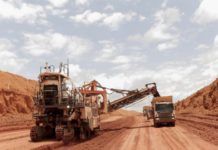
SIBANYE-Stillwater said a regional bushfire at its Century Zinc tailings retreatment operations in northeast Australia had destroyed surface piping which would see it produce 9,680 tons less metal than forecast for the fourth quarter.
“There has been extensive loss of surface piping infrastructure, including the feed and water lines that connect the hydro mine to the processing plant and other key service lines,” said Sibanye-Stillwater in an announcement on Friday.
It would take until about November 16 to replace and install the new piping. However, primary operations including the processing plant, hydro mine, airport, underground slurry pipeline and camp had been protected from the fire.
Neal Froneman, CEO of Sibanye-Stillwater said the event underpinned the importance of producing minerals that would help offset the impact of climate change, and other events such as the fire that hit the Century operations.
No employees were injured as a result of the fire. “Our operational teams have been unwavering in their efforts to help manage the bushfire at the Century operation and the neighbouring areas,” Sibanye-Stillwater said.
Sibanye-Stillwater had targeted production of 87,000 to 100,000 tons of payable zinc from Century Zinc, which are situated in Queensland state, for its 2024 financial year. About 42,000 tons was produced in the first six months of Sibanye-Stillwater’s financial year (ended June) which the group said was at the lower end of guidance owing to “adverse weather in the first quarter”.
The Johannesburg-headquartered group is hoping Century Zinc will make a positive contribution to pretax profits (adjusted Ebitda) in the second half of the financial year, assisted by operational recovery and improved metal prices.
Sibanye-Stillwater said in October that due to the relatively short reserve life of the zinc tailings operations at Century, it was looking at extensions through “leveraging the existing processing plant, pipeline and port infrastructure”.
This includes opportunities to potentially utilise the extensive phosphate resources in the region that are largely undeveloped, it said.
Sibanye-Stillwater can’t catch a break at the moment. On October 10, a court in the UK found the company was not justified in cancelling a share purchase agreement for two mines in Brazil from Appian Capital Advistory. As a result, there will be a trial next year to see the amount of compensation, if any, is payable to Appian Capital.
Appian Capital, which is still the owner of the Santa Rita and Serrote assets, is claiming about $600m including interest from Sibanye-Stillwater.










